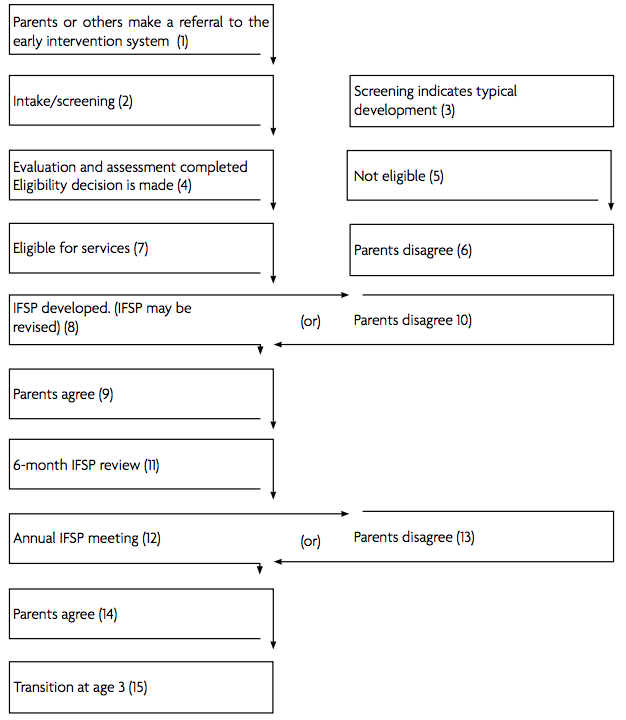
Understanding the Early Intervention System
Print Version
What is Early Intervention?
Early intervention is a system of coordinated services that promotes the child’s growth and development and supports families during the critical early years. In Minnesota, the lead agency is the Minnesota Department of Education (MDE). Early intervention services for eligible children ages birth to 3 and their families are federally mandated through the Individuals with Disabilities Education Act (IDEA).
The purpose of early intervention services is to:
- Enhance the development of infants and toddlers with developmental delays or disabilities
- Minimize the need for special education and related services after infants and toddlers with disabilities reach school age
- Maximize the potential for individuals with disabilities to live independently in society
- Enhance the capacity of families to meet the special needs of their infants and toddlers with developmental delays or disabilities
What Does Early Intervention Include?
Early intervention services are determined through an Individualized Family Service Plan (IFSP). The IFSP should be the result of cooperative planning between you and the team of other people who are learning about your child. By working closely with the family, early intervention professionals ensure that both services and community supports, including family supports, are brought together to meet your child’s and family’s unique needs. All interventions should be designed to enhance your child’s development within your daily routines. Participation in early intervention services is voluntary and you can choose which available services your child and family will receive.
Early intervention services are provided at no cost to the family and may include:
- Assistive technology devices/services
- Audiology (hearing) services
- Family training, counseling, and home visits
- Health services
- Medical services for diagnostic or evaluation purposes
- Nursing services
- Nutrition services
- Occupational therapy
- Physical therapy
- Psychological services
- Service coordination
- Sign language and cued language services
- Social work services
- Special instruction
- Speech language pathology services
- Transportation and related costs
- Vision services
- Other services
Understanding the Early Intervention Services Process
An Overview for Parents
The chart below offers an overview of the early intervention services process. It is not designed to show all of the steps or the specific details. It shows what happens from the time the child is referred for evaluation through the child’s transitions at age 3. The process begins when someone (parent, family member, childcare provider, doctor) makes a referral for an initial evaluation. (An explanation of each numbered area follows the chart moving toward receiving services.)

How the Process Works (Steps)
- Parents, family members, doctors, hospitals, public health nurses, or childcare providers—all can refer a child to an early intervention program.
- After receiving the referral, someone from the early intervention program will contact you to discuss your concerns. This person may be called a service coordinator or IFSP facilitator. The coordinator facilitator will ask you if your child has a medical diagnosis and may ask you to complete a brief questionnaire over the phone. Based on the information that you provide, a decision will be made to either do a full evaluation or begin with a screening. You must give your permission in writing before the team can proceed. If a decision is made to go ahead with the evaluation, your child’s development will be looked at more closely.
- If the screening indicates that your child is developing typically, the team can provide you with information about other resources that might be available in your community. You can also ask that the team review your child’s development again at a later time. If you disagree with the team’s decision, you have a right to request a full evaluation.
- The initial evaluation and assessment should be scheduled at a time that is convenient for you. Once a child is referred, the team has 45 days in which to complete the evaluation. You must provide written consent before the evaluation can begin. A team of professionals will meet with you to review the results of the evaluation and determine if your child is eligible for early intervention services.
- If your child is not eligible, someone from the team should tell you about other community resources that may be available to help. You may also ask the team to review your child’s development again at a later time.
- If you disagree with the evaluation report or eligibility decision, you have a right to request an Independent Educational Evaluation (IEE). Someone who does not work for the school district does the IEE. The school district must pay for the IEE or show at a due process hearing that the school district’s evaluation is appropriate (see below for Due Process Rights).
- If you and the district agree that your child is eligible for services, you and the early intervention staff will meet to write an Individualized Family Service Plan (IFSP). This meeting must take place within 45 days of the date of referral.
- You will work with the other members of the IFSP team to determine outcomes for your child, and if you want to, you can also include family outcomes. The outcomes will be based on needs that were identified during the assessment process. After the meeting, you will be sent a copy of the proposed IFSP. The IFSP will list the outcomes, the services, and supports that will be provided, when they will be provided, and the name of your service coordinator. You will also receive a Prior Written Notice and a Parent Consent/objection form. If you agree with the IFSP, check “yes” and sign the form. If you disagree with the entire proposed IFSP, check “no” and sign the form to begin the process of resolving your disagreement (see step 10). If you disagree with some but not all of the proposed IFSP, write down your objections on the form (some forms include a specific place for this; others may not). You will have 14 calendar days in which to sign and return the form. You must also sign the IFSP signature page before services can begin.
- If you agree with the IFSP, services must begin as soon as possible after you have signed the consent form. If you have any questions or concerns regarding services, you can contact your service coordinator.
- If you disagree with the IFSP, you can request an IFSP team meeting to try to work out your disagreement. In addition, you may request a conciliation meeting. If you still disagree, you can use your due process rights. If you agree with some of the services and disagree with others, the services that you and the team agree on can be delivered while you continue to work on areas of disagreement.
- The IFSP must be reviewed in six months to see if your child is making progress toward the outcomes. This may be done with your service coordinator or other members of the team. You will decide if any changes need to be made to the outcomes or services.
- The IFSP must be rewritten annually. The IFSP team will review the progress that your child has made on the outcomes and write new outcomes as needed. There may also be new family outcomes depending on the needs of your family in relation to your child’s development. Services may also be changed.
- If you disagree with changes in the new IFSP, discuss your concerns with your service coordinator. You may request a conciliation meeting. If you still disagree after the conciliation meeting, you can use your due process rights. During the time that you are trying to work out your disagreement, your child will continue to receive the services listed in the previous IFSP.
- If you agree to the changes, your child will continue to receive early intervention services.
- At the age of 3, your child will transition to Part B (of IDEA) services, if he or she is eligible. The IFSP team must conduct a transition meeting with you at least three months before your child’s third birthday. This could be part of a regularly scheduled IFSP meeting. If your child may be eligible for Part B services, the team should discuss options for services. If your child may not be eligible, you should be referred to community programs that may be available for your and your child.
If you disagree at any point in the process, you may request a conciliation, mediation, facilitated IFSP meeting or due process hearing. You can call PACER Center at any time and ask to speak with a parent advocate for more information.
Due Process Rights
Due process protects the right of parents to have input into their child’s educational program and to take steps to resolve disagreements. When parents and school districts disagree with one another, they may ask for an impartial hearing to resolve issues. Mediation must also be available.
Mediation is a meeting between parents and the school district with an impartial person, called a mediator, who helps both sides come to an agreement that each finds acceptable.
An impartial due process hearing is a meeting between parents and the school district. Each side presents its position, and a hearing officer decides what the appropriate educational program is, based on requirements in law.
School districts must give parents a written copy of special education procedural safeguards. This document outlines the steps for due process hearings and mediation. Parents must be given a copy when their child is first referred for an evaluation and each time they are notified of an IEP meeting for their child.
